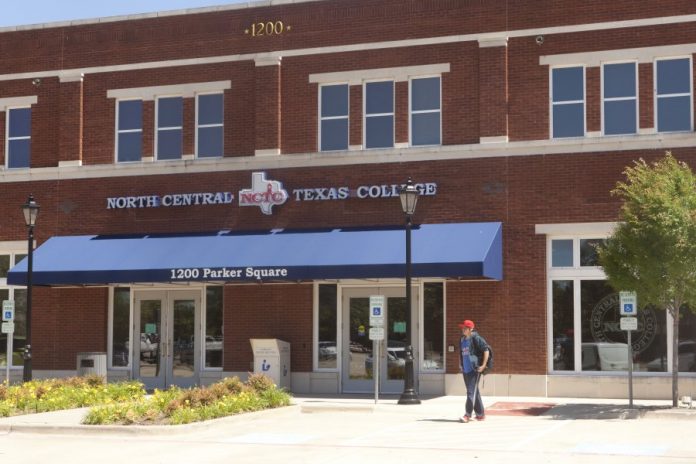
In the early 1900’s, the Wichita Falls Independent School District began to offer the public college-level instruction at reduced cost– by using ISD buildings after regular school hours.
Wichita Falls Junior College (WFJC) was the brainchild of Superintendent Randolph Clark. The academic entity offered two-year Associate Degrees and one-year Technical Certificates. WFJC eventually grew into Midwestern State University (MSU).
Clark knew a good thing. In 1924, after becoming Superintendent in the Gainesville ISD, he launched Gainesville Junior College using the same pattern.
After several name changes and land acquisitions, the current iteration of the school, North Central Texas College (NCTC)– with five campuses in four counties– has the distinction of being the oldest continuously operating public community college in the state. Wow.
From the look of the construction at Flower Mound’s Parker Square campus, bigger changes are in the works. More than 30,000 square feet of change, according to Mrs. Jessica DeRoche, the Flower Mound Campus Director.
“NCTC recently partnered with MSU to offer NCTC students and graduates local access to its four-year university diploma programs,” she said.
The two institutions will retain their separate identities, but their significant academic strengths will now make affordable baccalaureate degrees available to area residents.
“People choose to attend a community college for a number of reasons, including cost efficiency,” DeRoche said, about community college tuition and fees being lower than other institutions, adding: “NCTC’s academic core credit hours may be transferred to fulfill requirements for many four-year degrees.”
Much of the first two years of higher education is spent completing the college academic core classes in writing, reading, mathematics, sciences, history and foreign languages, while dabbling in elective classes.
Unlike heavy hitting four-year schools, Texas community colleges’ open-admission policy opens an educational door that might be shut to many potential students.
“All admitted NCTC students must take the Texas Success Initiative (TSI) test before they may register for the first time,” she said. “The TSI assesses academic readiness in reading, writing and mathematics.
For example, if a student scores low in reading, he or she would not register for reading-intensive history classes, until passing NCTC’s College Preparatory reading class.
“The objective of the TSI and College Prep classes is to pave the way for academic success,” said Elizabeth Dieter, an NCTC media team member. “We don’t want discouraged students who [may] drop out. There is almost no one we can’t help. We want all our students to graduate.”
Late bloomers aren’t the only students who benefit from the College Preparatory program. Youths legally emancipated early in life from adult supervision often need to catch up academically.
“Community college is a good transition from high school to the demands of the university.” DeRoche said.
Undocumented students, with spotty public school attendance, receive appropriate remedial help. College Preparatory classes ready people from non-English speaking backgrounds to compete in regular classes. Don’t hold back if tuition and fees might be a problem, because there’s financial aid.
“We’re ready and able to help applicants navigate the online forms,” DeRoche said.
The school partners with the community groups and businesses to fundraise for scholarships.
“Every year we join with Argyle Methodist Church in a family fishing tournament called ‘Casting for A Cause,’” she said. “The proceeds help defray school expenses for students of modest means. In September is our annual miniature golf tournament at Zone Action Park in Lewisville. They’re both a lot of fun.”

Bringing the State University to town required increased campus square footage.
A 30,000-square-foot, two-story building under construction on the east side of Parker Square will house classrooms, two science laboratories, a combination laboratory and lecture classroom, three interactive television classrooms, and two seminar classrooms.
The facility also will have tutoring and study space, administrative and faculty offices, a bookstore with a coffee bar and grab-and-go food items, and a conference room that will be available for community use.
While MSU will still offer classes beginning fall 2017, the new building will not be open to the public until January 2018.
MSU’s degree completion offerings will help many NCTC graduates transition easily to a four-year degree: Bachelor of Applied Arts and Science, RN to BSN/MSN, RRT to BSRC (Respiratory Care), RT to BSRS (Radiologic Sciences), Elementary/Middle School Education, and Special Education.
“Our goal with this partnership is to connect people to a baccalaureate degree that is affordable and accessible,” said Dr. Emily Klement, NCTC Associate Vice President of Strategic Partnerships.
The NCTC system’s campuses offer its 10,000 students: a 60-credit hour Associate of Arts Degree; a 60-credit hour Associate of Science Degree; 60-credit hour Associate of Applied Art or Science Degrees; and, a number of career and technical certificates for completion of its shorter credit hour programs. Majors range from accounting to nursing to welding.
“We offer many attendance options, from traditional full daytime instruction to evening, weekend, online, dual credit, hybrid, and continuing education classes,” DeRoche said.
Dual credit classes allow high school students to take college classes that will fulfill high school graduation requirements AND give college credits. Now there’s a win-win without the expense of Advanced Placement exams.
Hybrid classes are popular with busy adults who attend class once-a-week, then complete the rest of the work online.
Continuing Education provides non-credit instruction in an array of interesting areas of knowledge.
NCTC has 10 full-time faculty members who typically teach five classes each semester. They are joined by 80- to 90-Adjunct Instructors who teach up to three classes per semester. All faculty have either full-blown Master’s Degrees or 18-hours of completed post-graduate credentials in their field of expertise.
So, what interests you or your student? A two-year commitment? Coordinating work/school/family life? Online access? Want to bone up, then get that four-year diploma? Need a technical certification? Like the idea of a low pressure Continuing Ed class? DeRoche and Dieter agree, NCTC offers it all for a reasonable cost.
For information about the school, a course catalog, degree programs, faculty, and special events check out www.nctc.edu.



















